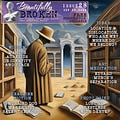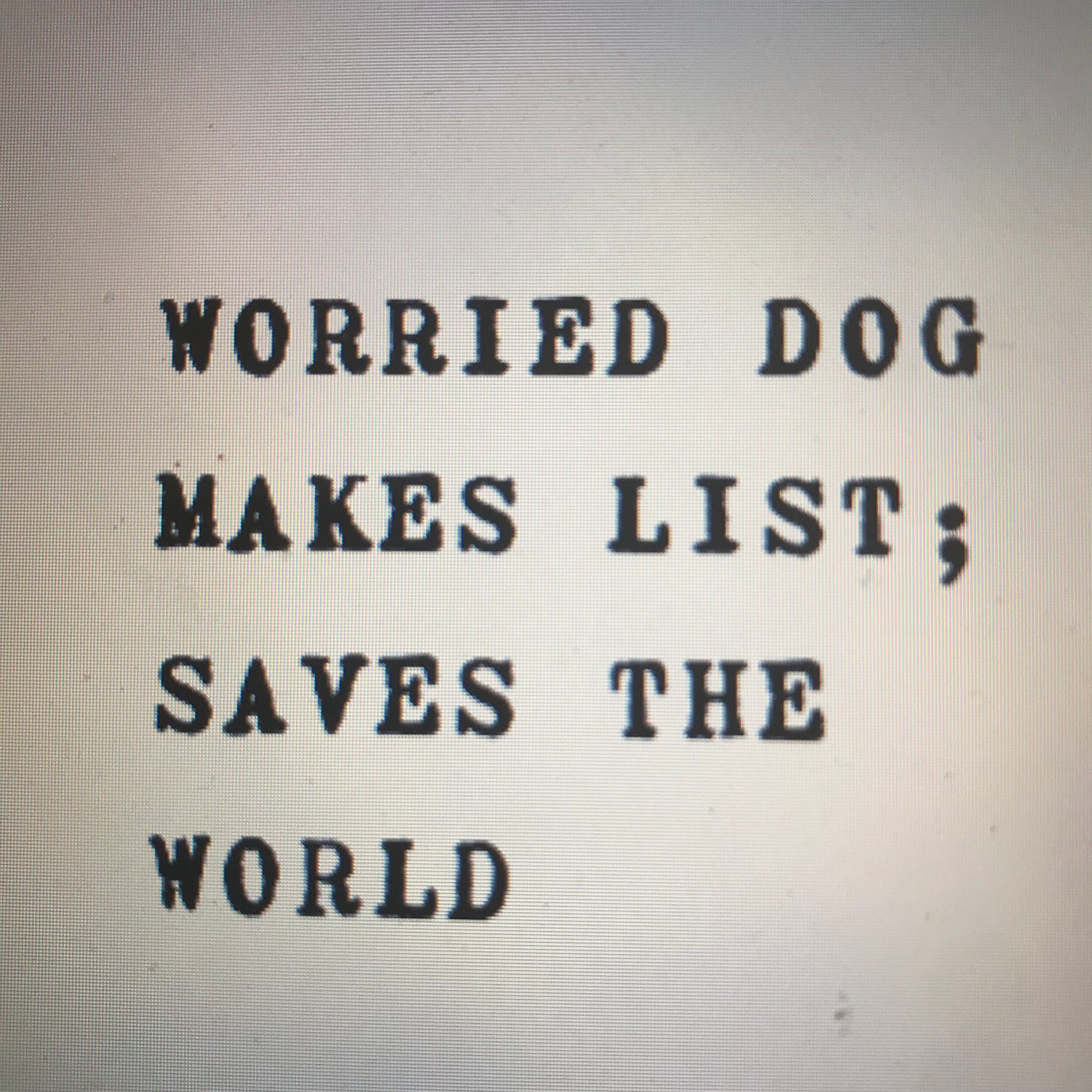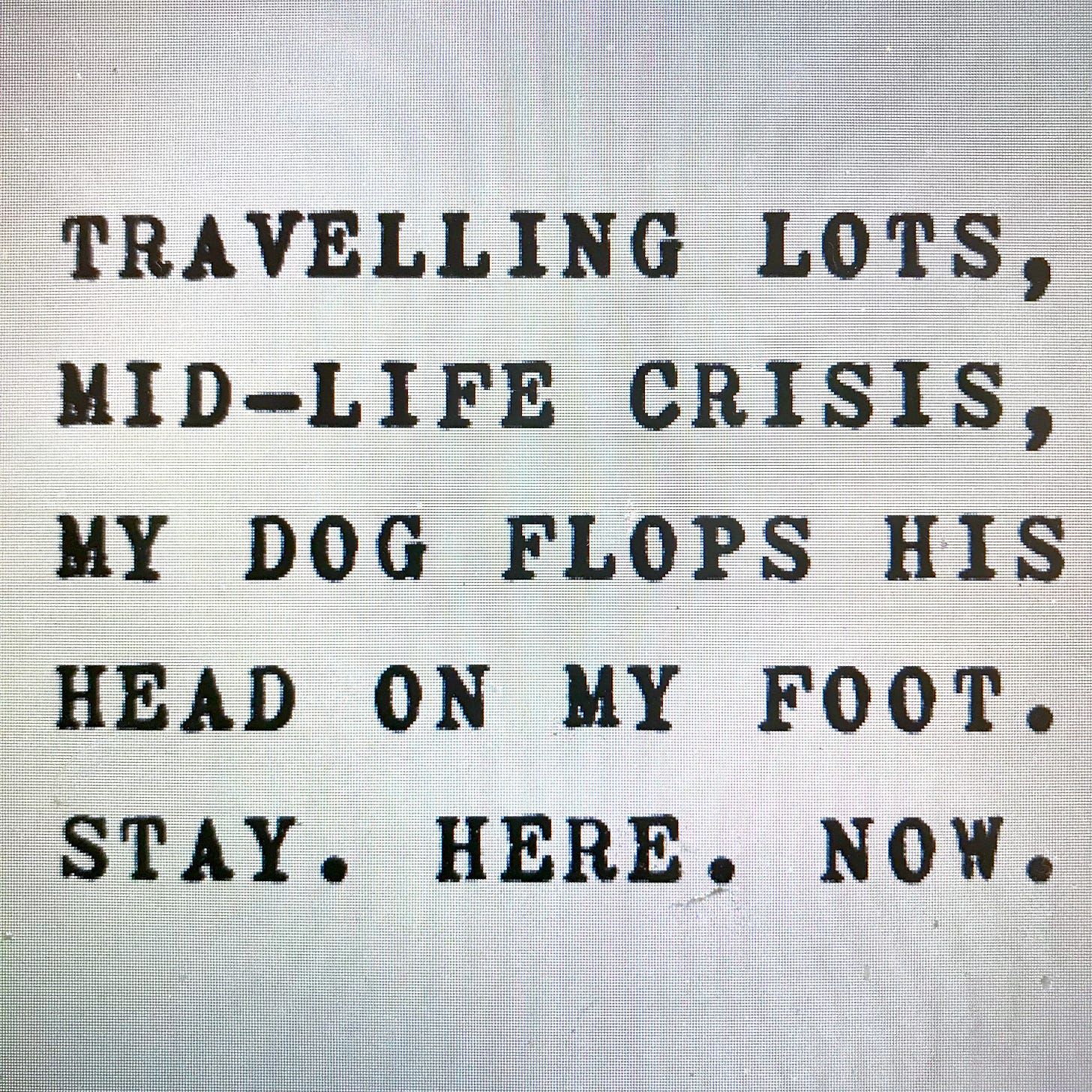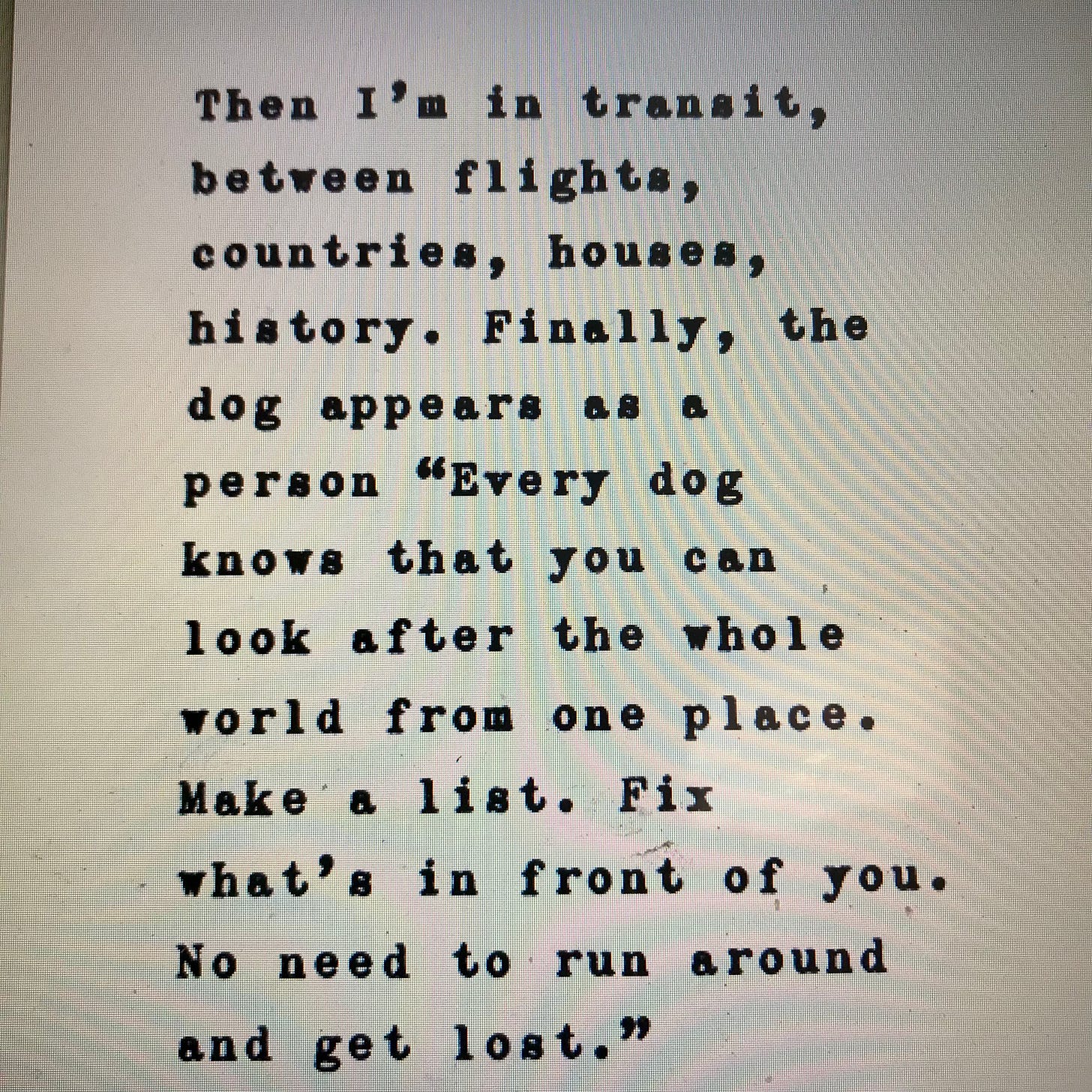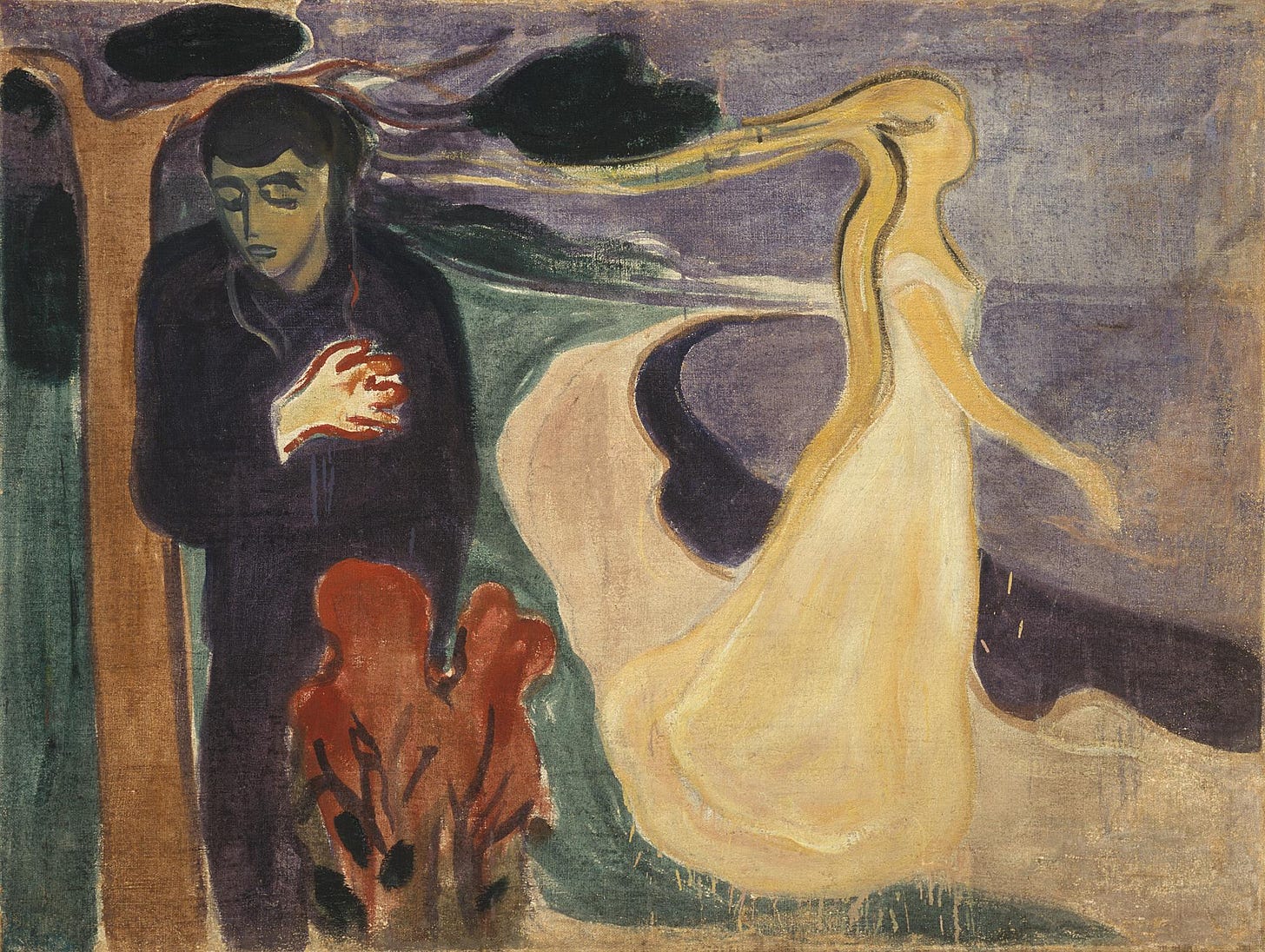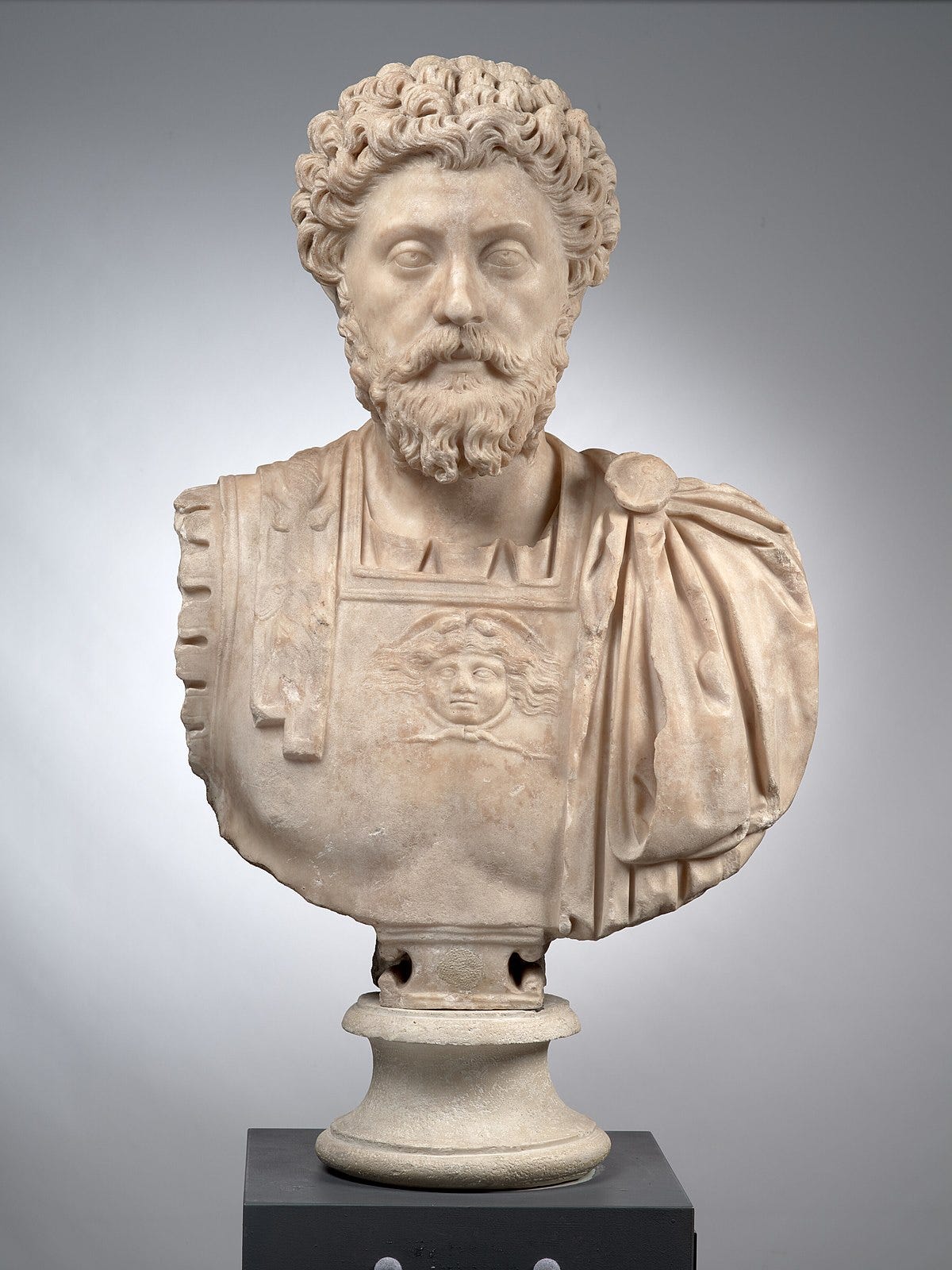Beautifully Broken Issue #28: Location & Dislocation
IDEAS, ART & WISDOM TO REPAIR OUR BEAUTIFUL WORLD
Happy Saturday! Welcome to Beautifully Broken Issue #28: Location & Dislocation
IDEAS: Location & Dislocation
Here’s a riddle for you. I was born in South Africa to a South African father, emigrated to Australia when I was three years old, but my mother is Scottish. I grew up in Australia and now live in France. Quite often I stay in London for business. And the riddle? It’s the same puzzle we’re all faced with: Who am I? Where do I belong? How do I identify myself? Am I a Scottish-Australian-South African who lives in France? Or is that too diluted an identity to be meaningful?
LOCATION
This week I returned to France via London after three months in Australia. On my first night in London I awoke from a dream at 3 am, completely disoriented. In the dream I was in France but when I awoke I was certain that I must still be in Australia. It took ten seconds of scanning the room in the dark to recall that I was actually in London. The subconscious mind doesn’t do well with too much change (or at least mine doesn’t). We need a home, a place of fixed reference points to anchor our mind as we evolve and grow. For the subconscious mind everything is symbolic. It doesn’t differentiate between the dream world and the real world—both are imbued with meaning. A cup that I use every day as I work acquires a symbolic energy. It’s repeated use in the same location resonates with the unconscious, becomes part of our language (the symbolic exchange between the unconscious and conscious) and may even appear in our dreams.
In a similar way, land shapes us as we shape it through long association. How much deep meaning must land that has been lived on for thousands of years have to those who exist there? How painful to be dispossessed of our ancestral land and the collective environmental symbolic language that has been built by generations of ancestors over time.
Human culture arises out of evolutionary adaption to an environment. Ten thousand years of desert living shapes the mind and body in a different way to ten thousand years of forest dwelling, or icy extremes. There’s a shared commonality to human existence—survival, cooperation, inclusion, sensory adaption to surroundings, but the amplitude of those experiences fluctuates depending upon environment (people surviving in mountains acquire different physiology and symbology to those who do the same near the ocean, or those who live in forest).
Out of this physical/psychic experience stories arise that we tell one another, spiritual beings are perceived and relationships formed with them (just look at any ancient culture - they all have fairies, spirits, important rocks and pools that contain energies that need to be negotiated with in order for the indigenous people to survive), and traditions that help us understand one another and our relationship with our environment are established.
This is the importance of location.
On the other hand an over-association with a physical locale is the cause of much suffering in the world. Have you ever said or thought “I am this land, this is my land and that land of other people like me. It is not for others who are not like me”?
Or perhaps you put it another way—“I am French” or “I am Australian, “Egyptian”, “English”, “Turkish”.
Because we long for inclusion and belonging and are also inherently lazy, we quickly learn that the fast track to inclusion, in being included in the group of our greater tribe (nationhood) is to learn the list of things that we agree make us who we are in this location and then, conversely, to identify those groups who have characteristics that are not on the list (outsiders). Instead of doing the deep work resonating with our environment, in planting roots and becoming part of our environment, we get lost in a man-made identity game and start reinforcing our social position by excluding others. And what to do when, because of the history of human suffering, colonization and forced relocation, two groups have long-time claims on the same land?
Because we fear to explore our inner self as well as step outside of familiar boundaries, our over familiarity with the land allows us to project all our worst instincts on the outsider and seek to eliminate them so our relationship with the land can be preserved without pollution. A crazy idea that leads to insurmountable suffering and tragedy in human history. The truth is, minus our cultural projections, the land will exist quite happily with or without human beings (if it had a preference it might choose “without”, since we cause so much environmental destruction in order to take more than we need from our environment). The grass and soil on this side of the border are not French, and on that side of the border Italian. The connection we have developed with the land as tribal groups has in many ways been lost as we have expanded from smaller tribal communities to larger national groupings. Our territory is formulated by war and argument, lines are drawn on maps and then we set about continuing conflict in order to defend those lines, sometimes with our lives and those of our children.
Can we exist anywhere by maintaining our culture? Can our connection to the land become symbolic, will the earth support our sense of identity wherever we are in the world? These are questions worth exploring, for the sake of humanity and our survival. Perhaps we can learn to be located in dislocation?
DISLOCATION
Dislocation may seem like a negative, but then we have just explored the positive and negative of location, so dislocation, likewise has its strengths and weaknesses.
Human beings are curious, we are explorers. The courage to venture out of our familiar territorial environs allows us to grow, to see differently, to expand beyond the familiar.
Since I was born in the early 70s the population of the earth has more than doubled. With the advances of modern medicine the global population will continue to grow. As advanced communications and travel allow for a more globalized world, migration is inevitable. How many people in the world today can say, “since time immemorial my people have dwelt here, in this one place?” One of the most French people I know told me that his ancestors were Greek seafarers who arrived in France and settled more than a thousand years ago. Is he still French? Or Greek? Where is his land? Has he been in France long enough that he has a connection to this land? Or should he find a home in Greece? Since he is part of the European Union he has the opportunity to put the question to the test should he choose, and could migrate without restriction to Greece. What a wonderful thing, borderless travel.
Getting back to the point of dislocation — journeying to other places long enough to understand another way of being, of thinking, of existing — is the beginning of wisdom, for we need comparison in order to see ourselves clearly. They think like this, I think like that, neither is right or wrong, just an adaption to a situation. Therefore, what is it that I believe that I have taken for granted and not examined? How do I know that what I believe is true? How many of my beliefs have I just inherited and accepted unquestioningly and what is actually true according to my own experience? These are the questions at the heart of philosophy, of living the examined life, of starting an expansion beyond our limited frame of reference to connect to something bigger than ourselves, the consciousness that infuses the universe, that unites all beings, including other human beings.
We must run the risk of dislocation in order to grow into a new, global identity. Even with our burgeoning population, there is enough good land on earth for everyone to have a home and to sustainably exist if we cooperate with one another. Share your culture, don’t horde it. Use it to include everyone who wants to connect with you and you may inspire others to do the same.
Every other human being on planet earth has more in common with you than they differ. If you are located, invite someone you consider an outsider to share your food, your house, your life, and when fear and desire are removed, you will find your brother and sister embracing you back. In turn, when you are dislocated, listen for those locals who understand and welcome outsiders, who see strangers as not so strange. Does that sound naive? I think it sounds better than that alternative: living a small life with the fearful thought “mine” hovering over me like a black cloud. Better a cloud with a silver lining that hums “one world, one love, peace now”.
HEADLINE FICTION #13: Worried Dog Makes List; Saves The World
Here's a new format for short fiction that I've invented. It's a 70-word story in three panels with a pattern of 7-16-47 words, where the first 7 words form a headline style title, the 16 serve to fill out the headline information a little more and the final 47 contain the meat of the story and resolution. I think I'll call it "headline fiction". These micro stories of mine are based on dreams (and nightmares!).
ART TO MEDITATE UPON
Separation by Edvard Munch, 1896.
Edvard Munch (1863 – 1944) was a Norwegian painter. His 1893 work The Scream has become one of Western art's most acclaimed images.
His childhood was overshadowed by illness, bereavement and the dread of inheriting a mental condition that ran in the family. Studying at the Royal School of Art and Design in Kristiania (today's Oslo), Munch began to live a bohemian life under the influence of the nihilist Hans Jæger, who urged him to paint his own emotional and psychological state ('soul painting'); from this emerged his distinctive style.
Travel brought new influences and outlets. In Paris, he learned much from Paul Gauguin, Vincent van Gogh and Henri de Toulouse-Lautrec, especially their use of color. In Berlin, he met the Swedish dramatist August Strindberg, whom he painted, as he embarked on a major series of paintings he would later call The Frieze of Life, depicting a series of deeply-felt themes such as love, anxiety, jealousy and betrayal, steeped in atmosphere.
Meditation: As human beings we have an instinct to unify opposites, for instance, men and women try to find a way to exist together as a unit, one being, out of which arises new beings (children). When these essential relationships are broken the suffering we encounter is intense, far greater than the simple physical absence of the loved one. There is a rejection of unity, that the plan of nature and the heart has gone wrong.
In the painting the man is dark, turned away towards the shadow, unable to watch the woman who is cast as a semi-divine being, faceless, her hair blending with the sky, her dress with the sea and the road. His heart is wounded because he is disconnected not only from a person but from the universal archetype of unification. He is broken, disunified, separated from a creation in miniature that came into existence when two beings were united by love. Now he can choose to do difficult work—instead of withdrawing into himself, to separate himself from life, he can turn back towards the light, to allow the love he felt to expand and propel him towards a new life, a greater love that his relationship was connected to and continues on even in its absence.
WISDOM OF OTHERS
Marcus Aurelius’ Meditations, 6.14
Most items that evoke popular admiration belong to the general class of things held together either by coherence (hexis) or by nature (physis), such as stones and logs, or figs, vines, and olives…Somewhat superior people are impressed by things held together by soul (psychê), such as flocks or herds, and still more refined people are impressed by things held together by rational soul (logikê psychê), though not meaning rational as such but skilful or artistic in some way. Yet one who values a soul that is rational and sociable (politikê) no longer focuses on these other things but above all on keeping his own self (literally ‘his own soul’) in a rationally active and sociable condition, and cooperates with his fellow human beings to this end.
Marcus Aurelius Antoninus (121 –180) was Roman emperor from 161 to 180 and a Stoic philosopher. He was a member of the Nerva–Antonine dynasty, the last of the rulers later known as the Five Good Emperors and the last emperor of the Pax Romana, an age of relative peace, calm, and stability for the Roman Empire lasting from 27 BC to 180 AD. He served as Roman consul in 140, 145, and 161
Meditations is a series of personal writings by Marcus Aurelius, Roman Emperor from AD 161 to 180, recording his private notes to himself and ideas on Stoic philosophy.
Marcus Aurelius wrote the 12 books of the Meditations in Koine Greek as a source for his own guidance and self-improvement.
It is unlikely that Marcus Aurelius ever intended the writings to be published. The work has no official title, so "Meditations" is one of several titles commonly assigned to the collection. These writings take the form of quotations varying in length from one sentence to long paragraphs.
PHOTO HAIKU
Lost in the forest,
I'll build a camp where I stand,
and plant my heart deep.
Photo: A copy of Dante's Inferno in The London Library, St James's
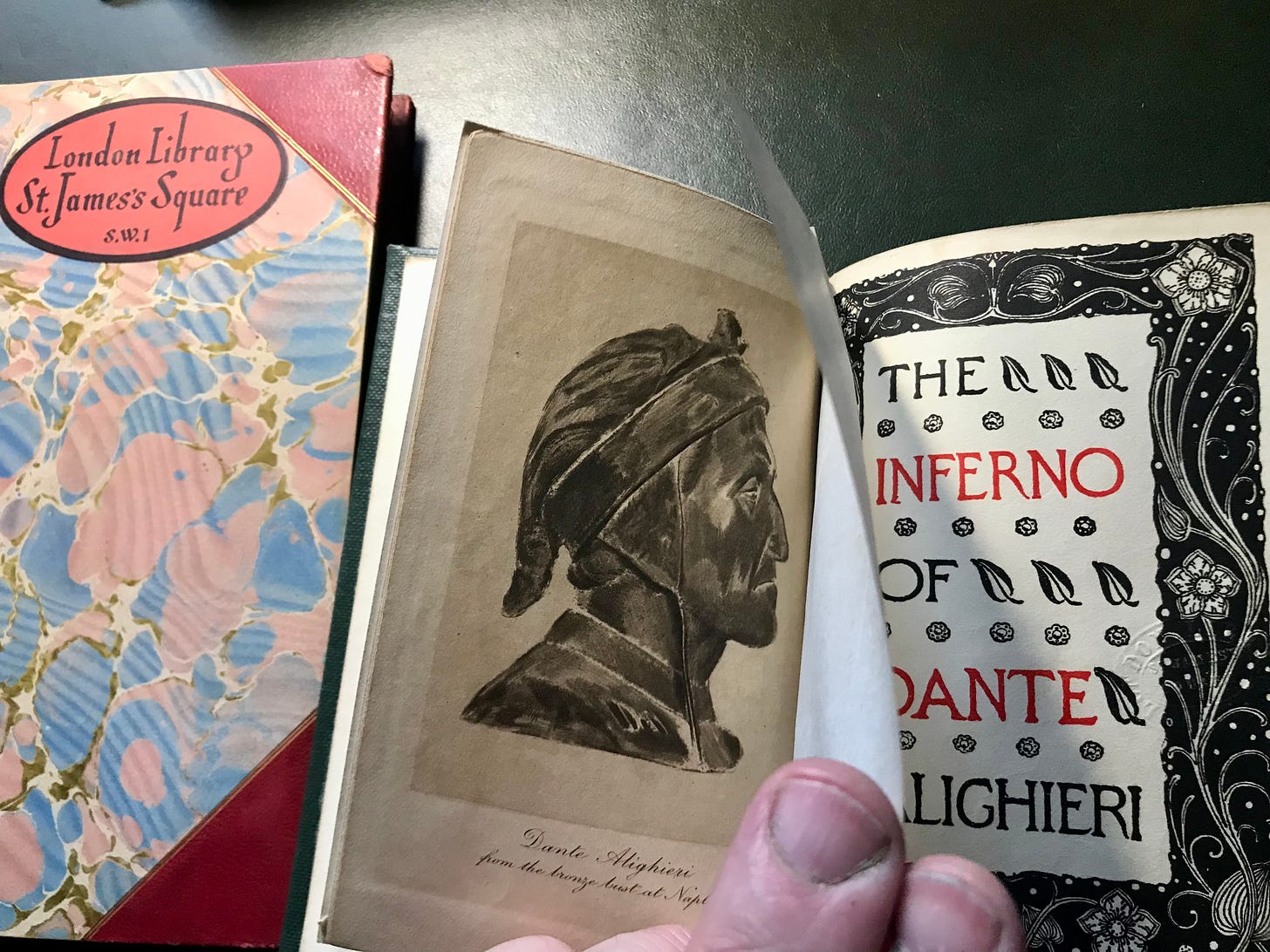
Ideas To Live By In The Coming Week
Do I identify with the land beneath me? Does this sense of identity come at the expense of separating myself from other human beings? How can I redefine my cultural identity to include other human beings and share what is important to me?
If you feel dislocated, that you don't belong anywhere, sit and look within until you feel the connection that is the birthright of every being in creation, that we are part of a greater reality that always embraces us unless we disconnect and turn away from it.
There is a whole world within, and through it you can connect to the world outside and transform it in a positive way. Doing this helps others connect to their own inner lives and one by one, we move the world towards peace and harmony.
Peace Now,
28th September, 2024

